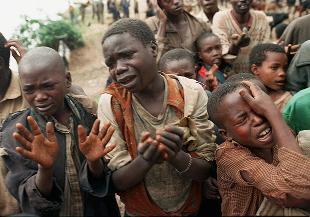Twenty years later the memory of Rwanda stands out: from the Pieve Saverio Tutino prize to the Prix Italia
Rwanda, commemoration: Ban Ki-Moon: UN indelible shame.
Kagame attacks Paris: accomplice
Rwanda: "If this is a man".
Marcella De Palma's reportage from 1995
Rwanda twenty years later: the story of a genocide
The man who inspired Hotel Rwanda, twenty years later: "I live and fight since exile"
Share
September 29, 2014 The International Criminal Tribunal for Rwanda upheld on appeal the life sentence against the two leaders of the ruling party in Rwanda at the time of the 1994 Tutsi genocide,
Matthieu Ngirumpatse
and
Edouard Karemera
. The two had been convicted in the first degree in December 2011 for genocide and war crimes. The sentence was handed down in Arusha, Tanzania, where the International Tribunal is based.
The genocide
The Rwanda genocide was one of the bloodiest episodes in the history of the 20th century. From April 6 to mid-July 1994, for about 100 days, at least 500,000 people were systematically massacred (with firearms, machetes and spiked sticks) according to Human Rights Watch estimates; the number of victims, however, has risen to reach a figure of approximately 800 thousand or one million people. The genocide, officially, is considered concluded at the end of the Operation Turquoise, a humanitarian mission wanted and undertaken by the French, under the authorization of the UN.

